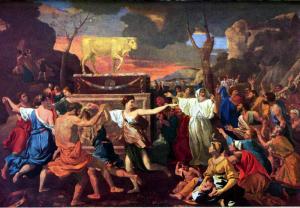Is it possible that believers can blaspheme God? The answer might surprise you.
Old Testament

There were serious penalties for blaspheming the name of God in ancient Israel. The law of God said that “Whoever blasphemes the name of the Lord shall surely be put to death. All the congregation shall stone him. The sojourner as well as the native, when he blasphemes the Name, shall be put to death” (Lev 24:11), but there are other ways to blaspheme God and His holy Name, and that’s by bringing shame to the name of Christ by not living by the words of Christ. Ancient Israel was originally called to be kings and priests, and to be a light to the pagan nations of the world. When the nations around Israel saw how Israel was blessed and living in safety and security, the nations would see Who is the One, true God, but Israel’s obedience usually didn’t last for long. Their prosperity brought their decline. They trusted in their abundance and not in the Lord, so they fell into idolatry, at one point, even falling so far as to offer child sacrifices in the fire, so God instructed Ezekiel to tell Israel, “Thus says the Lord God: In this also your fathers blasphemed me, by dealing treacherously with me” (Ezk 20:27b). They blasphemed God’s good name by their treachery of God. They substituted things made with hands, like stone, wood, or other carved images for the true God, the very Creator of these things. That means they began to worship the creation instead of the Creator. The Apostle Paul said of those in his day that “they exchanged the truth about God for a lie and worshiped and served the creature rather than the Creator, who is blessed forever” (Rom 1:25). That’s blaspheming the One, true God.
Conduct and Blaspheme
Years ago a couple who had been living together and in sexual immorality. They felt guilty about it and sought counsel of whether this was sin or not. Then, they openly rejected the counsel they had been given. The marriage counselor was a Christian and said that the Bible says that there should be no sex outside of or before marriage. Sex was designed for the marital relationship and not between friends or acquaintances, or even those you’re engaged too. Apparently, they only wanted him to condone their choice, but he wouldn’t budge from the Word of God. It wasn’t long before their non-Christian neighbors began to slander the church or the name of Christ because they could see that this couple lived no differently than others they knew who were not Christian. They reasoned, if that’s Christianity, they want no part of it. When David committed adultery and murder through conspiracy, Nathan confronted him about these sins, so “David said to Nathan, “I have sinned against the Lord.” And Nathan said to David, “The Lord also has taken away your sin; you shall not die. However, because by this deed you have given occasion to the enemies of the Lord to blaspheme, the child also that is born to you shall surely die” (2 Sam 12:13-14; NASB). David had brought shame to the throne, to the nation, and to the God he served. His conduct gave “occasion to the enemies of the Lord to blaspheme” God’s name.
Works and Blaspheme
The Apostle Paul knew well enough about blaspheming God’s name by a person’s conduct, and so he wrote that “The name of God is blasphemed among the Gentiles because of you” (Rom 2:24). Ouch! That hurts. They were not only requiring circumcision and observance of the law, but they were even “breaking the law” (Rom 2:23). There were actually written reports about the Jews doing this and these reports were contrary to the gospel of Jesus Christ. They had a plan of salvation rather than looking to the Man of Salvation. These Jews were blaspheming God and His free gift of grace (Eph 2:8-9) by trying to add works to it. They attempted to save themselves by works, or law-keeping (Rom 2:17-24), and required others to do it too. By the way, it’s impossible to keep the law perfectly, but I think that’s the point. It shows we cannot save ourselves by works and so we must run to God for His mercy and grace. And that’s just what He wants! On the Day of Judgment, many will discover just how worthless their works are (Matt 7:21-23).
Unforgivable Sin
 There are other articles that address the so-called “unforgivable sin,” and deal better with this issue than I can right here and now, but most have read Mark 3:22-30 where Jesus, in speaking to the scribes, said that “all sins will be forgiven the children of man, and whatever blasphemies they utter, but whoever blasphemes against the Holy Spirit never has forgiveness, but is guilty of an eternal sin” (Mark 3:28-29). Why did Jesus tell this to the scribes? Because “they were saying, “He has an unclean spirit” (Mark 3:30). The scribes must have known better since they did much of the work in copying the Old Testament. Scribes were in one of the most important and sacred of duties that could be given, and that’s being given the responsibility of recording the very words of God. This means they knew the Scriptures better than most, and Jesus clearly fulfilled dozens of Old Testament prophecies about Him. The scribes had seen Jesus’ miracles, and yet they accused Him of using satanic powers. They were blaspheming the Holy Spirit by accusing Jesus’ working miracles by Satan when it was actually the Holy Spirit’s work.
There are other articles that address the so-called “unforgivable sin,” and deal better with this issue than I can right here and now, but most have read Mark 3:22-30 where Jesus, in speaking to the scribes, said that “all sins will be forgiven the children of man, and whatever blasphemies they utter, but whoever blasphemes against the Holy Spirit never has forgiveness, but is guilty of an eternal sin” (Mark 3:28-29). Why did Jesus tell this to the scribes? Because “they were saying, “He has an unclean spirit” (Mark 3:30). The scribes must have known better since they did much of the work in copying the Old Testament. Scribes were in one of the most important and sacred of duties that could be given, and that’s being given the responsibility of recording the very words of God. This means they knew the Scriptures better than most, and Jesus clearly fulfilled dozens of Old Testament prophecies about Him. The scribes had seen Jesus’ miracles, and yet they accused Him of using satanic powers. They were blaspheming the Holy Spirit by accusing Jesus’ working miracles by Satan when it was actually the Holy Spirit’s work.
Conclusion
The Bible is full of historical figures who blasphemed God by their behavior and their lives ended badly. The Apostle Paul wrote of those who rejected the grace of God, and “By rejecting this, some have made shipwreck of their faith, among whom are Hymenaeus and Alexander, whom I have handed over to Satan that they may learn not to blaspheme” (1 Tim 1:19-20). James saw blaspheming God’s name and being partial to the rich and discriminating against the poor. He wrote, “But you have dishonored the poor man. Are not the rich the ones who oppress you, and the ones who drag you into court? Are they not the ones who blaspheme the honorable name by which you were called? If you really fulfill the royal law according to the Scripture, “You shall love your neighbor as yourself,” you are doing well” (James 2:6-8). Anything that looks like sin to the world may not actually be sin, but if we abstain from every appearance of evil (1 Thess 5:22), the world will have less reason to disdain the name of Christ by whom we identify. We will therefore not blaspheme God by our lives but rather bless God by our lives. And in turn, perhaps, bless others and draw them to Christ.
Article by Jack Wellman
Jack Wellman is Pastor of the Mulvane Brethren Church in Mulvane Kansas. Jack is a writer at Christian Quotes and also the Senior Writer at What Christians Want To Know whose mission is to equip, encourage, and energize Christians and to address questions about the believer’s daily walk with God and the Bible. You can follow Jack on Google Plus or check out his book Teaching Children the Gospel available on Amazon.











